Facebook has given credence to the idea that so-called “fake news” is a threat to British democracy, placing adds in establishment newspapers ahead of the UK general election.
The advertisements, in papers including The Times, The Guardian, and Daily Telegraph, give a list of 10 things for the reader to look out for when deciding to trust a story.
The advice includes being “sceptical” of headlines, checking the date of the story, and ensuring it is not a satirical or humorous article.
MPs have been putting the social media platform under pressure to act, after activists claimed fake news influenced the Brexit vote and election of President Donald J. Trump.
The ads come as tens of thousands of Facebook accounts have been closed in the UK as part of a crackdown on fake news, The Times reports.
“We’ve made improvements to recognise these inauthentic accounts more easily by identifying patterns of activity without assessing the content itself,” Facebook told the paper.
“With these changes we expect we will also reduce the spread of material generated through inauthentic activity, including spam, misinformation or other deceptive content that is often shared by creators of fake accounts.”
It is unclear how Facebook – which has been accused of liberal bias before – defines “fake” and “inauthentic” accounts such that they can be deleted.
Last month, a Parliamentary select committee cited an analysis by the left wing blogging platform Buzzfeed to imply fake news influenced the U.S. election and demanded Facebook censors online content in the lead-up to the general election.
In January, the committee announced an inquiry into fake news, following the lead of the German legislature, which threatened Facebook with fines in December 2016 if the unfavourable content was not removed quickly.
Some German lawmakers claimed fake news could help populists in this year’s federal elections, and in January Facebook launched new features in Germany to help users identify fake news. Such features have not yet come to the UK.
Facebook suspended 30,000 accounts in France ahead of the first round of its presidential election last month and has also previously taken out full-page ads in German newspapers to educate readers on how to spot fake news.

COMMENTS
Please let us know if you're having issues with commenting.